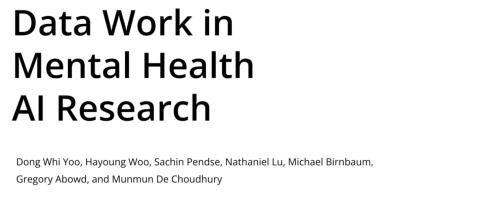Recently, Artificial Intelligence (AI) and adjacent areas (eg, big data) have led a rapid advancement not only in computer science but also various other areas (eg, health). To broaden the impact of AI technologies, more data scientists are collaborating with other stakeholders, such as domain experts. Therefore, Human-Computer Interaction (HCI) and Computer-Supported Cooperative Work (CSCW) researchers have paid particular attention to the collaboration between data scientists and domain experts surrounding AI research projects.
However, data scientists and domain experts are not the only important stakeholders in AI research projects. To deploy the results of the projects in real world settings, human infrastructure such as IT experts and legal experts in organizations have a clear understanding of the proposed technologies and have confidence in administering and governing the technologies within the existing infrastructure. If the research projects aim to support human behaviors, we need to understand the motivation and expectations of the people who generated and owned the data used in developing the AI technologies because the participation and engagement of the targeted population are crucial in the successful deployment of new AI technologies.
Therefore, this study will seek to understand diverse stakeholders' perspectives in AI research and their collaboration and conflicts in the research process. More specifically, we will conduct a case study of the THRIVE project that aims to create novel AI technologies to support mental health patients. In the project, clinical researchers at Northwell Health have recruited mental health patient participants who are willing to provide their personal online data such as Facebook activities and Google search history. More than 300 patients have voluntarily provided such personal online data. Data scientists at Georgia Tech have analyzed the data to understand linguistic features regarding symptom presentations and predict the illness trajectories. The clinical researchers at Northwell Health and the data scientists at Georgia Tech collaborated to publish the results of their AI technologies in highly renowned journals and conferences in both the mental health and computer science domains. This project provides an opportunity to deepen our understanding in AI research because it is a long-term, successful, and interdisciplinary AI research project. By conducting a case study of the THRIVE project, we seek to answer this research question: how do stakeholders collaborate and conflict with each other during the research process?
Project Name
Faculty Lead(s)
Munmun De Choudhury, Gregory Abowd
Student Name(s)
Dong Whi Yoo, Hayoung Woo, Sachin Pendse
Main Contact
Munmun De Choudhury
Lab Name
Social Dynamics and Wellbeing Lab
Video Title
Data Work in Mental Health AI Research
Video URL
https://www.youtube.com/watch?v=yw5UXt0lcqA
Lab URL

